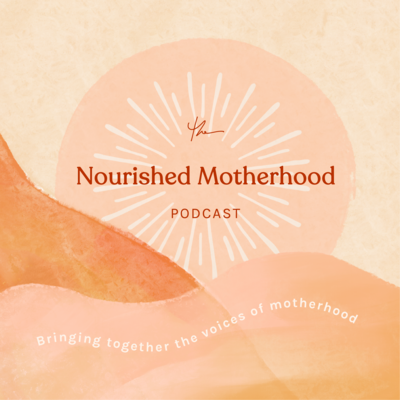December 9, 2021
Rethinking Prenatal Nutrition


If I told you that as a pregnant mama, your prenatal nutrition affects the long-term health of not only you and your baby but even your grandchildren-would you believe me? While it sounds a little crazy, the research supports this! What an incredible gift we have the chance to give our growing families.
While this is a big passion of mine, I understand how easy it is to get food confused in our society. That’s why I’ve invited registered dietician and nutritionist, Lily Nichols to help us understand why many of the prenatal nutritional recommendations offered are actually outdated.
We’re talking about the importance of including real food in your diet, why protein is mama’s top priority and some easy ways to get the most nutrients to you and that growing baby! Let’s dive in!
Moments You Don’t Want to Miss
[12:00] Hear about Lily’s passion to help mothers fill the gap between old recommendations for prenatal nutrition and what the research shows now
[21:41] Learn why what mama eats affects the long-term health of babies - and grandbabies
[25:12] Wondering what “real food is?” Lily helps us “digest” this concept
[34:51] Find out why Lily will always recommend a protein-rich diet for pregnant mamas
[47:15] Feeling food confused? Lily helps offer some simpler recipe ideas that you can start whipping up today
The Impact Of Prenatal Nutrition On Epigenetics
Kelly Jo: Can you define epigenetics and why what we eat - especially in utero - is so important for the future?
Lily: So epigenetics refers to how your environment or various exposures affect you. These can be positive influences, like getting sufficient sleep, light, and nutrients. It can also include negative experiences as well. Being exposed to toxins or excessive amounts of stress can impact the expression of your genes.
Your genetics are inherited, but the expression of them can be influenced by these various exposures. The earliest this goes back to is pregnancy and arguably preconception with both your mother and father. That can have a long-lasting effect on your health.
With the diabetes example, if a mother has elevated blood sugar during pregnancy, (I would call it poorly managed gestational diabetes). She’s basically not getting appropriate care, and her blood sugars are regularly out of range. That child can face anywhere from a 6-19 fold increased risk of type two diabetes, or obesity by the time they're a teenager.
This is obviously really important because this is something that we can have a massive influence on with lifestyle changes. If you are able to maintain your blood sugar, for the most part in the normal range, a few highs are really not a big deal. Any pregnant woman is going to have a few highs. But we're talking about consistent extreme spikes, which is definitely avoidable with diet and lifestyle. Sometimes you need a little extra help with insulin and medication. But for most cases, we're talking about lifestyle and food.
That risk is essentially the same as somebody with a “normal pregnancy”. So that's only one example. You can give dozens of other examples. If you get sufficient amounts of choline, especially on the higher end (much higher than what the current recommended intake is) those children and toddlers have faster reaction times than the kids who got just the recommended intake. The same is true for things like vitamin B, 12, and vitamin D.
There's a lower risk of dental enamel defects in children born to mothers who had sufficient intake of vitamin D during pregnancy. So for all these examples, it’s about much more than getting bad genes. You might think - “My bad teeth just run in my family.” Well, sure, they could have, but there's also some epigenetic influence there as well. Was your mom deficient in vitamin D? What was her diet like? Those things likely had a huge influence on you.
What is Real Food Anyway?
Kelly Jo: So let's talk about what foods really build a healthy mom and a healthy baby. You wrote a book called Real Food for Pregnancy. What is real food for those listening that are unfamiliar with your work?
Lily: So people have all sorts of different definitions for real food. Mine really centers around food that is, for the most part - in its whole and unprocessed form. Or at the very least, it’s not processed in a way that removes nutrients. I think most people will look at this from the whole grain/white flour analogy, which is a valid analogy.
But I take it a step further and argue that we need to look beyond just whole grains and refined grains. We need to look at all our food sources, and that includes animal products like eggs.
Eating an egg with the yolk, as it comes in nature, provides a different array of nutrients than if you just eat the white. Most of the choline is in the yolk. Egg yolks are the number one source of choline in our diet. So if you're taking out the yolk, sure, you're throwing away the cholesterol, which we used to think was a healthy choice. You're also throwing away all the choline, and you're probably going to be choline-deficient. The same goes with the whole fat versus low-fat or nonfat, dairy products. Milk comes with fat for a reason. There are important nutrients in the fat, especially the fat-soluble vitamins that can improve your absorption of minerals and nutrients. So you don't want to throw away the fat.
It doesn't mean you have to eat 100% perfectly. It just means you’re trying to make the majority of your diet come from these nutrient-dense foods. It displaces a lot of things that we would consider empty calories. Those are foods that may have some energy in them, but they don't have any of the nutrients that really help your body run.
Taking the Overwhelm Out of Prenatal Nutrition
Kelly Jo: So what advice do you have for moms who just found out they are pregnant and want to take their prenatal nutrition seriously? How can we simplify the way we think about it and take the fear out of it and consider the budget at the same time?
Lily: Yeah. So some of the accessibility of certain foods is going to be dependent on where you live. If you're in a more rural area, you might be able to buy direct from farmers where you just cut out the middleman. If you're doing most things at the grocery store, I would really try to focus on hitting your protein requirements. That’s most important because that's really where you're going to hit the mark for most of your micronutrients.
So like when you buy eggs, even if it's the conventional eggs, don't throw away the yolks. Buy the whole eggs in the shell, not the liquid carton egg whites. They cost more and you get less nutrition. Look for full-fat dairy products. Larger containers are much less expensive than individual little yogurts or pre-sliced cheese. Start looking at cost per pound and those sorts of considerations.
Also, look for the meat that's on sale. Buy the cheap cuts of meat like chuck roast. Pork shoulder makes delicious pulled pork. These cuts are much less expensive than buying pork chops or steak. If you can, buy ground meat in bulk and plan to buy meat when it’s on sale and then freeze it for later.
You can buy direct from a farm and do a cow or pig share. With food prices where they're at, it's often less expensive to buy direct from the farm via meat share than it is to buy the conventional ground beef at the grocery store. It's kind of wild.
So there are all different ways that you can slice it, but I would be putting more of my budget towards the protein-rich foods, and then try to incorporate beans and lentils in there too. That's a really inexpensive source of protein. Invest in whole cuts of meat like doing chicken and making a roast chicken. Then save all the leftover bits and bones to make broth. Don't buy the $10 carton of pre-made fancy bone broth at the health food store.
A Few Closing Thoughts From Our Conversation
It is so refreshing to feel brought up to speed when it comes to understanding the research available to us regarding our prenatal nutrition. On the one hand, this information is so empowering! To think that we have the chance to break the cycle of a disease like diabetes for our children is incredible!
On the other hand, so much information can feel paralyzing. What if we make a choice that doesn’t support our baby’s development? The good news is there is so much grace and time to grow as your baby grows. If you even just focus on a protein-rich diet and use every part of a food, that’s a perfect start!
If you are already eating whole foods and a nutrient-rich diet, I encourage you to dive deeper into all of the articles and resources Lily has available on her website. You and your body are incredible mama, so go feed it well!
More From Lily Nichols


Lily Nichols is a Registered Dietitian/Nutritionist, Certified Diabetes Educator, researcher, and author with a passion for evidence-based prenatal nutrition. Her work is known for being research-focused, thorough, and critical of outdated dietary guidelines.
She is co-founder of the Women’s Health Nutrition Academy and the author of two books, Real Food for Pregnancy and Real Food for Gestational Diabetes. Lily’s bestselling books have helped tens of thousands of mamas (and babies!), are used in university-level maternal nutrition and midwifery courses, and have even influenced prenatal nutrition policy internationally.
Links & Resources Mentioned
Grab your FullWell Prenatal Vitamin and use the code NMCGIVE10 for 10% off!
Articles by Lily Nichols
Rate, Review, & Follow on Apple Podcasts
If you’re loving these conversations, please consider rating and reviewing the podcast! This helps me support more women - just like you - find the grace, encouragement and support they need at every stage of motherhood.
If you have an iPhone, go to iTunes and leave a review!
Not sure how? Check out this video!







